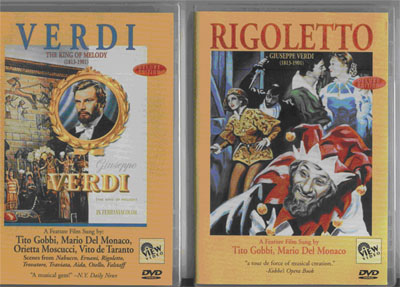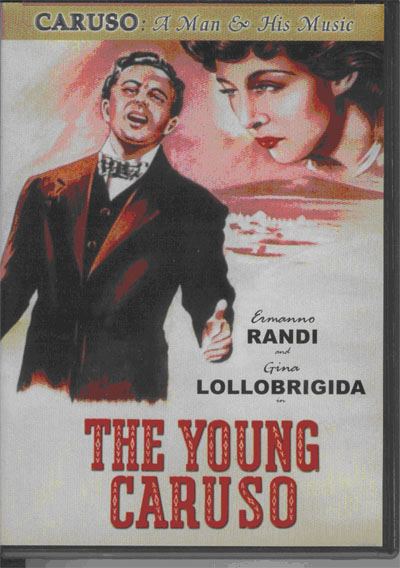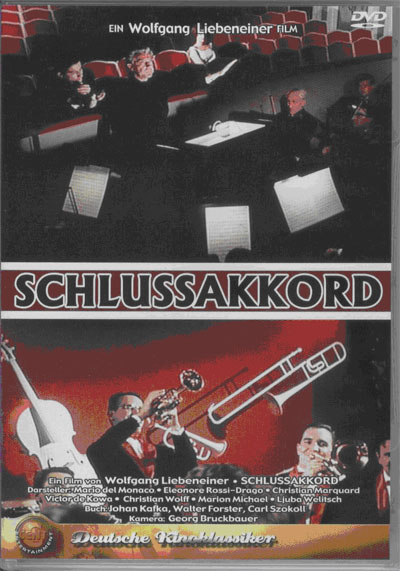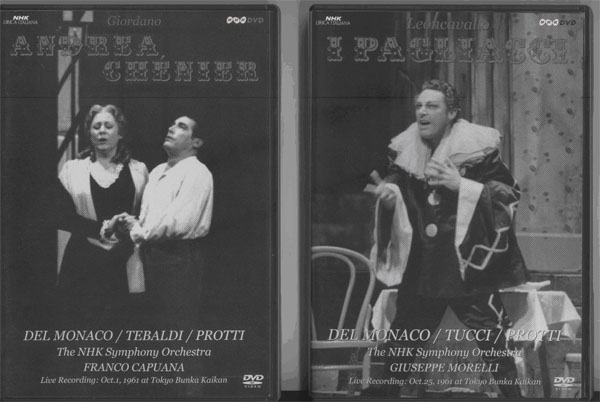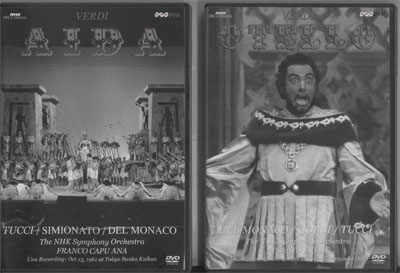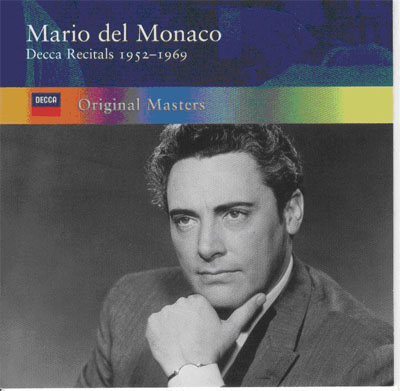
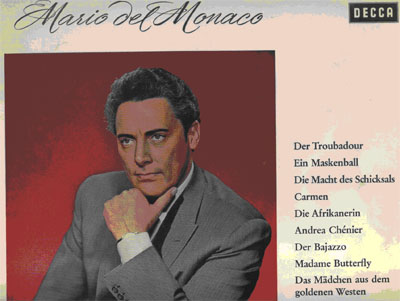
ALREADY 25 YEARS AGO : MARIO DEL MONACO
“What sense has life if I can’t sing any more””
(Mario Del Monaco shortly before his death)
There's a long history between Mario Del Monaco and me. As a young kid I once asked my opera-loving uncle who the greatest opera singer was in his estimation. Without hesitation he replied : Mario Del Monaco! My uncle who in the fifties and sixties had been stationed by the Belgian military in Germany had heard the tenor in a few of his German appearances and was immensely impressed by the Italian tenor's talent. So I amassed all my savings and headed off for the local record shop and I bought my very first record ever. I still treasure the worn LP and from the age of about 12 till 18 I learned my opera trade through the Del Monaco Decca legacy.
 |
 |
Decca’s newest compilation |
The very first record I ever bought |
About a year or so ago the Decca company brought out a Del Monaco compilation of all his recitals for the company in their medium-priced ‘Original Masters’ series. It was not the first compilation though; that honour had to go to Decca Japan (are we surprised?). Yet Decca Japan -while including excerpts from the complete recordings- lacked quite a few items from his solo recordings. Now more or less all the recordings of the great dramatic tenor are available on CD. “More or less?” I hear the fan longing for completeness say. Indeed the recent box does not contain all his solo recordings made for the British firm though some previously unpublished items are luckily included as a bonus. Nevertheless still missing is his 45rpm recording with two film songs recorded for the German movie ‘Schlussaccord’ featuring Eleanor Rossi-Drago and Ljuba Welitsch. Schlussaccord was Del Monaco's last movie in which he appeared and also sang. The movie has finally appeared on DVD and is discussed in our review section.
But let's get back to the present 'Original masters' compilation as there's so much to enjoy. Let’s start with his solos from Fanciulla, Gioconda, Forza, Loreley, Chenier and …….Bohème! Not many will associate our Otello with Puccini’s Rodolfo a role he nevertheless sang quite often in the initial stages of his career. He made his debut in the role in 1941 opposite Germana di Giulio and sang the role for the last time opposite Bidu Sayao in the States in 1953.
Since I first heard it I developped a specific fondness for Del Monaco’s Decca recording of Rodolfo’s aria. He performs ‘Che gelida’ with a wonderful tone, lyrical in approach and timbre and a superb clarion top note which drew full praise from Lauri-Volpi himself. A complete Boheme from Naples's San Carlo became available on Myto by the way but the sound is sadly enough atrocious.
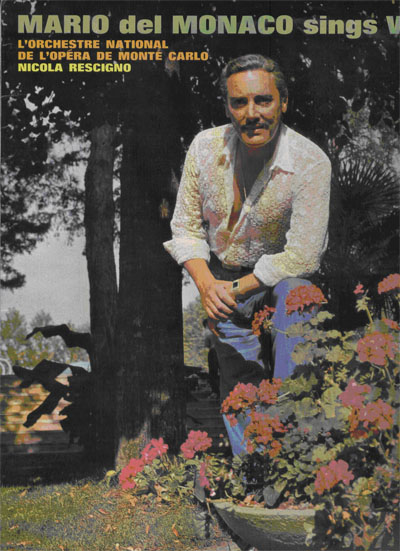 |
 |
The last LP for Decca |
The first ‘book’on the tenor |
Del Monaco's Dick Johnson is sung as to the manner born and his complete Chenier under Gavazzeni is the touchstone recording of this opera and so are his solos in this compilation.
While Del Monaco mainly recorded the standard repertoire he also had an eye for the less "popular" composers or works. His “hai ben raggione” from Tabarro is so much better than in the later complete version of the opera and no one can equal him here as the vocal writing fits so well into his vocal armour. But the first prize may probably go to the solo from Catalani’s Loreley. Nobody sings this rarely performed aria the way the way Del Monaco does in this prime recording. Del Monaco often expressed his wish to perform the role of Eléazar in Halévy’s La Juive and he occasionally performed the aria in his concerts. No wonder as the tessitura suits his voice perfectly. The deccca recording of 'Rachel' makes us regret he never was able to fulfil his wish. Leoncavallo’s Canio was one of Del Monaco’s most performed roles and I have a weakness for his Vesti la giubba and actually so did Brian de Palma as he used the tenor’s recording in his movie ‘The Untouchables’. And he was not the only one : Del Monaco's vesti la giubba is also used in "Cookie" and "Action Jackson". Speaking of soundtracks also Martin Scorsese uses Del Monaco's voice in Nessun Dorma in his part of "New York Stories". And this doesn't come as a surprise as both Scorsese and De Palma belonged to that generation for whom Mario Del Monaco was a household name and the star tenor per sé.
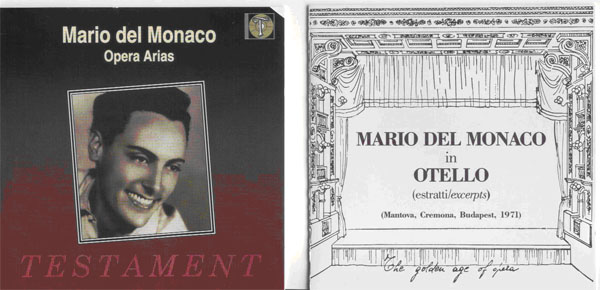
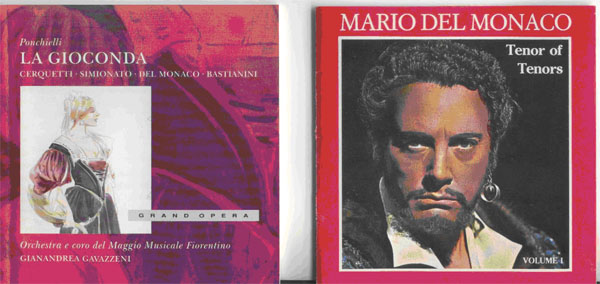
And the superlatives have to continue with ‘Giulietta son io’ from Zandonai’s forgotten opera, it’s simply without comparison. Listen to Alagna’s nevertheless admirable version and you’ll hear what I mean. Another winner recording is his final 'scena' from Catalani's La Wally: Del Monaco has the bite, the sound , the power, the stamina and the tessitura for this voice-killer. Never a weak moment in his delivery. Poor Ariaza and even young Bergonzi are defeated by Catalani’s tenor writing in this scene. Goodies from the lighter repertoire are also included such as his renditions of the scarcely recorded “Trobadorica” and “Varco d’o primo amore”. They’re so stylishly sung, full of morbidezza and display a legato of immense beauty. Ditto for his renditions of ‘Vurria’ and especially ‘Autunno’ (see also soundbites)which are both simply superb and belong to his best renditions of Neapolitan song.
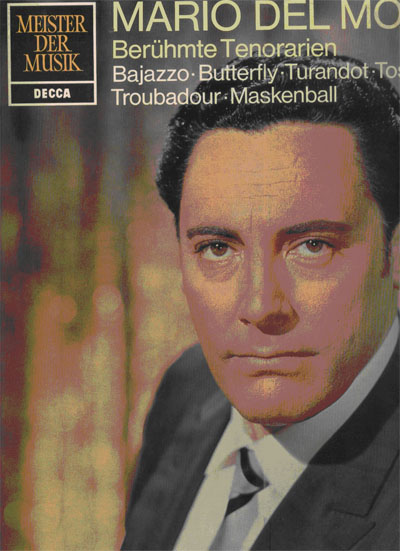
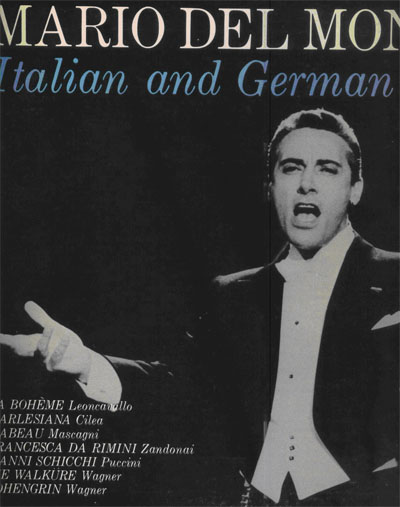
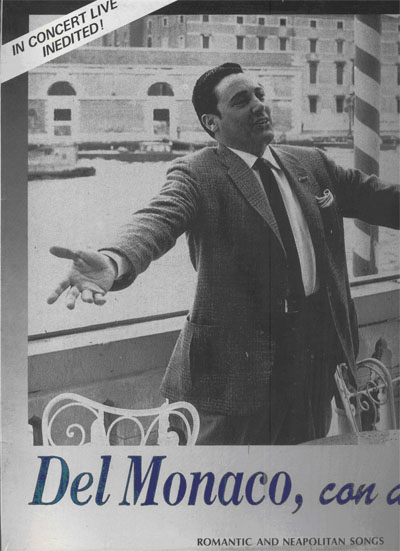
I have a deep fondness for Del Monaco’s Wagnerian recordings as well in spite of the not so perfect German. If you listen to his EMI recording of “Da voi lontan” you regret he didn’t record these pieces for Decca in Italian after all. So sad that never a recording of his Scala performances has surfaced.
The Wagnerian record's B-side (conducted by Benvenuti Franci’s son Carlo) has him coping admirably with Mascagni’s (another voice killer) Isabeau ‘arias” . His 1969 Verdi recital under Rescigno was one of the most interesting tenor recitals up to then repertoire-wise speaking as it introduced us to some never before recorded tenor solos. It was also his last recital ever for the Decca record company. A love affair which was initiated in 1952 and lasted for 17 years thus ended. Yet his recording career was not over yet. He would still record two LP's for other companies combining Neapolitan song and light repertoire. Two hits emerged including 'Un amore cosi grande' written especially for the tenor and a record which was even issued on 45 rpm. After his death other tenors also recorded the song (Pavarotti, Kraus...) yet without the impact the veteran tenor makes. The second hit (also issued on 45rpm) was 'Via del giglio 43' like the previous song a hit in the tradition of Carlo Buti and the later Claudio Villa.
And then there's still the one record which must have been Del Monaco's best selling solo album ever and that's the one with Mantovani. Since its first appearance "A Song For You" has been re-issued at least 6 times. Two 'songs' remained in decca's vaults until the Original Masters edition : an aria from Léhar's Zigeunerliebe and Modugno's famous 'Ciao Ciao bambina'. The first one he should have sung in Italian as he did with the aria from Paganini on the LP version and the Modugno hit is much better sung by Del Monaco in a live version for RAI as the Mantovanian tempo doesn't fit the music at all.
Del Monaco must have been the first tenor ever to have recorded Bernstein's Tonight and as far as I know the first one after Lanza to record 'Be my love'.
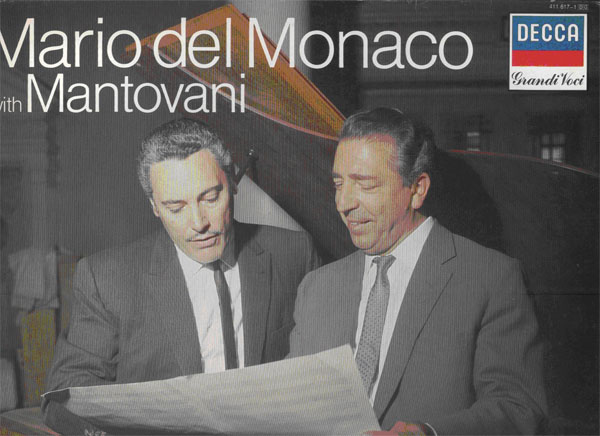
Del Monaco's legacy (commercial and non-commercial) of complete operas includes several unsurpassed recordings. Both his commercial recordings of Otello are unequalled which can also be said about Tebaldi's Desdemona. Moreover there are several wonderful 'live recordings' floating around opposite sopranos ranging from the veristic but impressive Clara Petrella, Tebaldi, De Los Angeles, Rysanek and Zeani to Katia Ricciarelli the last diva he strangled on stage. It also comes as no surprise that composer Umberto Giordano himself was so taken with Del Monaco's incarnation of Andrea Chenier. With his interpretation of the French poet for Decca he wrote or better sang history. This reference recording not only boasts the prime voices of Tebaldi and Bastianini but Gavazzeni creates a truly exciting atmosphere as well. There are live recordings with several impressive Maddalenas and the Callas worshippers owe it to Del Monaco that they can enjoy the Greek-American diva's incarnation of Maddalena. Of all his renditions of the famous improvisso one stands out : Naples 1954. Del Monaco as always sings as if his life depends on it and when listening to this superhuman delivery it comes as no surprise he drives the audience into delirium. Nobody ever delivered Chenier's entree aria as Del Monaco does here under Serafin. (see reviews for a recording)
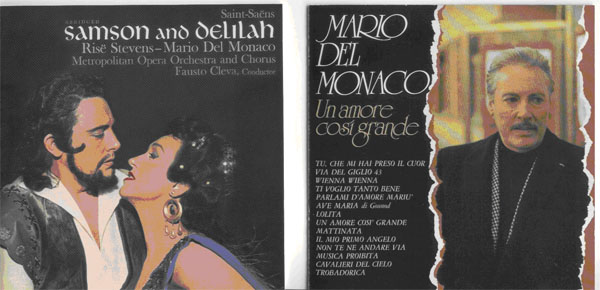
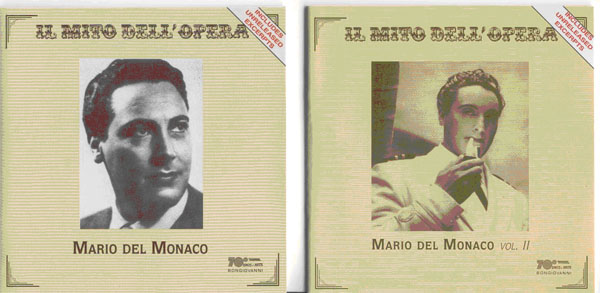
And then there's of course Fanciulla. Have there ever been better Dick Johnsons than Del Monaco or Corelli his only rival in this work? Decca's first stereo recording is another reference recording and remains unsurpassed in all its aspects.
A live recording from Florence under Mitropoulos not only offers music otherwise cut but also the wonderful Minnie of Eleanor Steber which is together with Tebaldi's a performance hard to beat. And then there's still Decca's Forza recording : Del Monaco, Tebaldi, Bastianini, Simionato and Siepi. Other recordings may offer one or even two singers of great interest but not one of them has an overall package such as Decca's. In 1968 both Del Monaco and Tebaldi were in their vocal Indian summer for their recording of La Wally but the only competition this recording has is the same couple's incarnation of the roles under Giulini at la Scala 19 years earlier and available on Myto. And there's still Pagliacci. As a youngster I heard Jon Vickers as Canio at Covent Garden and already at that time I couldn't understand Anglo-Saxon reviewers' enthusiasm for the Canadian tenor. Vickers's voice was loud, very loud but then it was an 'ugly' loud, with lots of puffs and a good dosis of crooning, overacting and hysterics. In no way did it compare to Del Monaco's firm control of his dramatic talents in the part. A matter of 'de gustibus'? I don't think so.
Both Decca recordings are wonderful memento’s of the tenor in the role and have superb Neddas such as the underrated Clara Petrella in the first version and Gabriella Tucci in the second.
Commercially Decca's first Adriana recording stands out as well and when compared the company's second recording with Sutherland and the worn Bergonzi sounds like a party disk. Gavazzi especially (Cetra) and even the older Scotto (CBS) are fine Adrianas but Prandelli lacks the bite and the strength for Maurizio and Domingo is Domingo.
Decca's first Gioconda too assembles a cast unequalled since with five top stars and featuring Cerquetti's only complete commercial opera recording. Several years ago a long-standing Met attendant once wrote to me that the longest tenor ovation he had ever witnessed was the one after Del Monaco's Cielo e mar in 1952. The last complete opera he recorded was Giordano's Fedora under Lamberto Gardelli. The veteran cast also boasts Magda Olivero (who jumped in for Tebaldi) and Tito Gobbi. All three are past their prime but sing the music as no one else since and not one single commercially recorded Fedora can compete with this vintage recording.
Del Monaco is the only post-war opera tenor who has five books written about him (in several languages) and one of the very few who wrote his own memoirs. Several DVD's have become available and there are more to come in the nearby future.
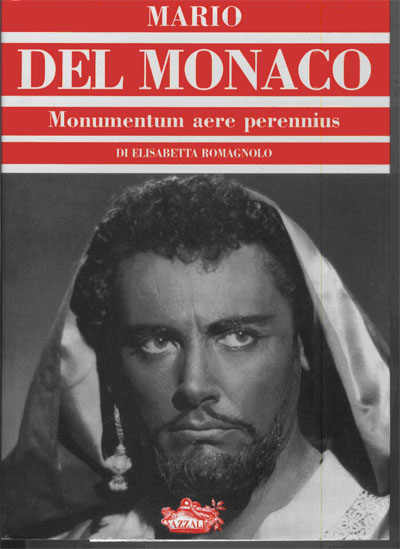
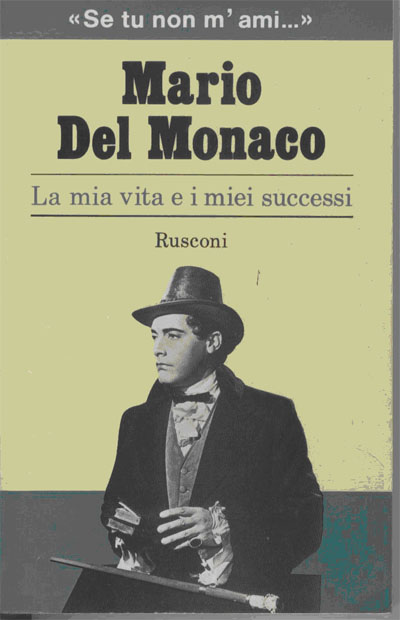
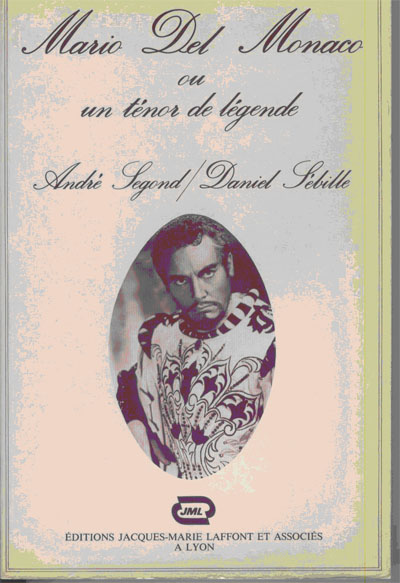
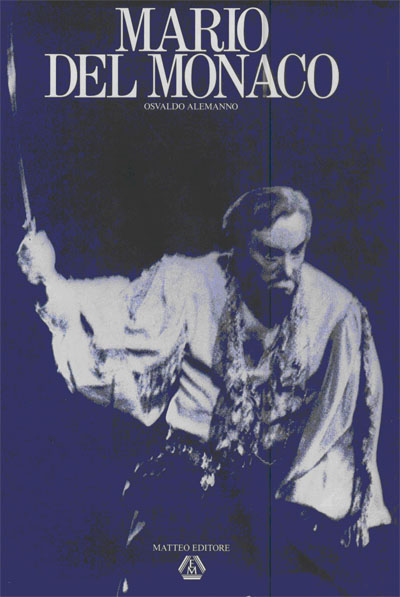
On October 16 it will be exactly 25 years ago that our collaborator Jan Neckers called me up on a quiet evening to tell me the tenor I grew up with had suddenly died. The day after it was front page news on most newspapers around the world. It would take another 25 years for another tenor to get the same attention and that was Pavarotti. Franco Corelli his former rival and who surprisingly attended Del Monaco's funeral in Pesaro told a local Italian newspaper 'He was the greatest of us all". Rina Del Monaco died in 1991 and is buried alongside her beloved husband in the cemetery of Pesaro. They left two children : Giancarlo and Claudio.
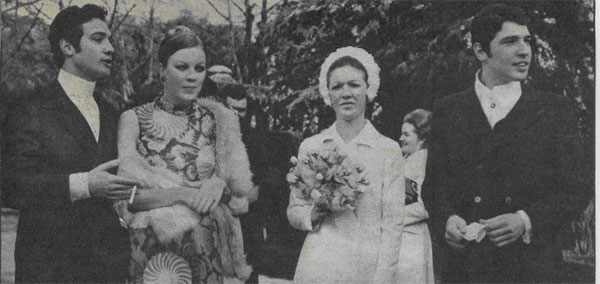
On October 26 a tribute concert will be given at the Teatro dell'opera in Rome and Decca will release a 3 CD set called 'Il Favoloso Del Monaco' containing previously unreleased material.
